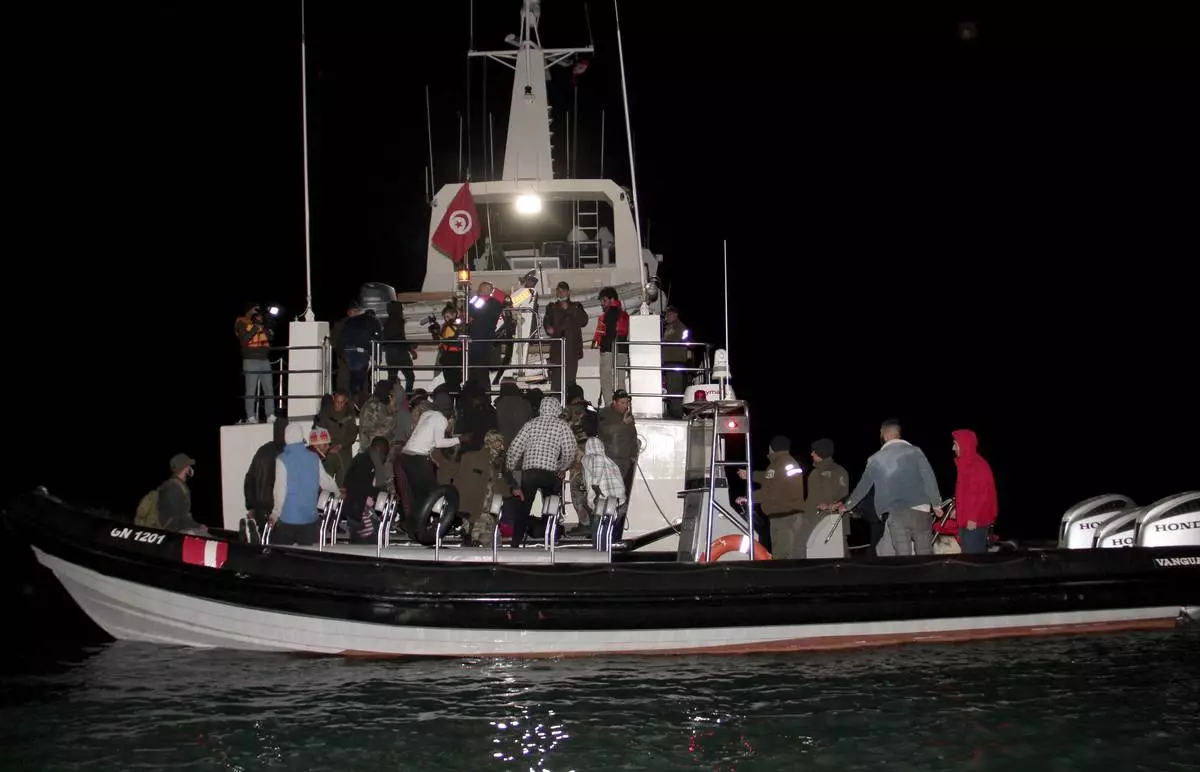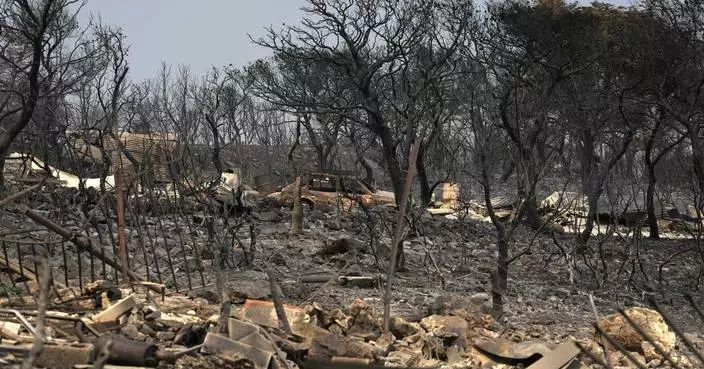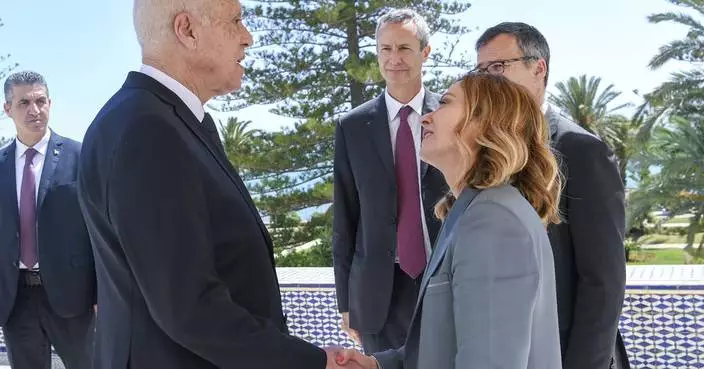Italy's populist government on Tuesday lashed out at France for criticizing its refusal to allow safe harbor for a rescue ship with 629 migrants, instead sending two military vessels to take on some of the migrant passengers in the waters off Sicily and escort the ship on a dayslong voyage to Spain.
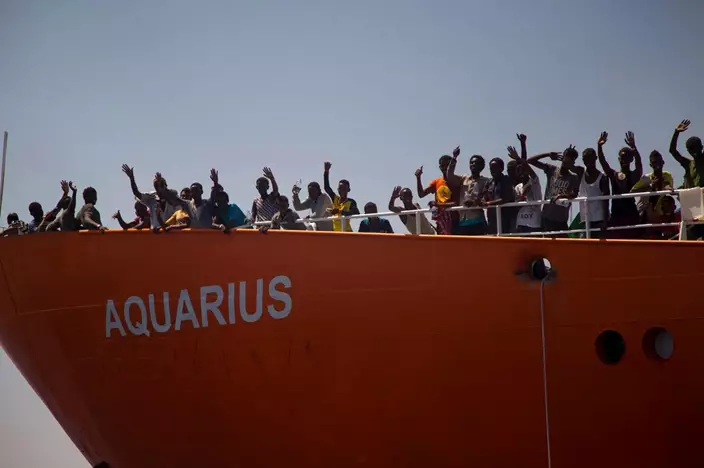
In this photo taken on Sunday, Aug. 21, 2016, migrants wave from SOS Mediterranee Aquarius rescue ship, after being rescued by members of the Spanish NGO Proactiva Open Arms during an operation at the Mediterranean sea, about 12 miles north of Sabratha, Libya. Italy's new "Italians first" government claimed victory Monday June 11, 2018. (AP Photo/Emilio Morenatti)
The standoff over the fate of the Aquarius, turned away by both Italy and nearby Malta but welcomed by Spain, has raised political tensions in Europe as the new Italian government wants neighbors to share more of the burden of migrant arrivals.
In a strongly worded statement, Premier Giuseppe Conte's office said "Italy cannot accept hypocritical lessons from countries that on the topic of immigration have always preferred to turn their heads." It singled out France, whose leader earlier was quoted as calling Italy's response "cynical," as having adopted migrant arrivals policies "much more rigid and cynical."
The government also said Italy had "never abandoned" the migrants as two patrol boats had accompanied the ship from the start.
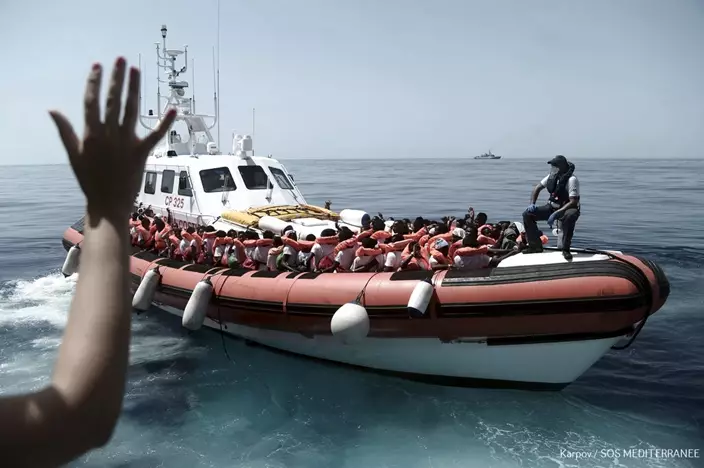
This undated photo released on Tuesday, June 12, 2018, by French NGO "SOS Mediterranee", shows stranded migrants aboard a Italian Coast Guard boat as they are transferred from the SOS Mediterranee's Aquarius ship to Italian ships to continue the journey to Spain in the Mediterranean Sea. (Kenny Karpov/SOS Mediterranee via AP)
Meanwhile, hundreds of the migrants aboard the Aquarius were being transferred late Tuesday to two ships operated by the Italian navy and coast guard, which will accompany the rescue ship to the Spanish port of Valencia some 1,500 kilometers (932 miles) away, a journey of some three to four days. It was unclear when the voyage might begin.
The Italian military chased a boat hired by The Associated Press away from the Aquarius. The Aquarius also declined to engage, responding with a radio message: "I kindly ask you to stay away from the Aquarius and not to complicate the situation. Thank your for your understanding."
Many of the migrants remained on the deck of the overcrowded rescue ship. Their safety was at risk for the longer voyage given the forecast of bad weather, said Mathilde Auvillain, a spokeswoman for the charity SOS Mediterranee that operates the ship with Doctors Without Borders.
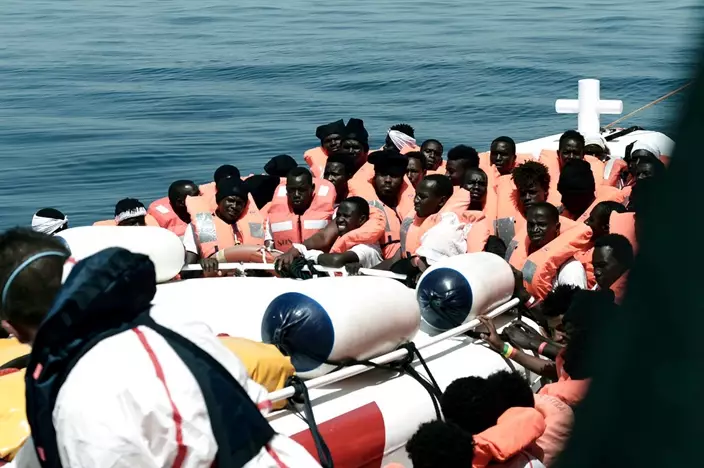
This undated photo released on Tuesday, June 12, 2018, by French NGO "SOS Mediterranee", shows stranded migrants aboard a Italian Coast Guard boat as they are transferred from the SOS Mediterranee's Aquarius ship to Italian ships to continue the journey to Spain in the Mediterranean Sea. (Kenny Karpov/SOS Mediterranee via AP)
A volunteer, Alessandro Porro, said the people on the ship — most of them from sub-Sahara Africa — welcomed the announcement Tuesday that their destination would be Spain.
"The news was received with a certain sense of relief among our passengers. The fear of being brought back to Libya was very strong," Porro said.
Doctors Without Borders, meanwhile, appealed to both Italy and Malta to reconsider their refusal to allow the stranded passengers landfall and then safe passage by other means to Spain.
Doctors Without Borders said the migrants — 123 unaccompanied minors, 11 children with family members and six pregnant women among them — were "exhausted and stressed" and warned of severe health risks to a significant number.
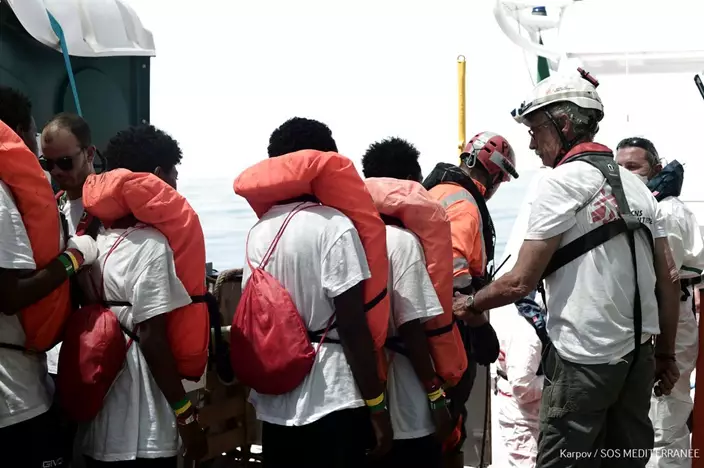
This handout photo released on Tuesday, June 12, 2018 by French NGO "SOS Mediterranee" shows migrants being transferred from the Aquarius ship, in the Mediterranean Sea. Italy dispatched two ships Tuesday to help take 629 migrants stuck off its shores on the days-long voyage to Spain in what is forecast to be bad weather. (Kenny Karpov/SOS Mediterranee via AP)
Fresh provisions including 950 bottles of water, 800 boxes of noodles and snacks, blankets, hats and socks were delivered to the Aquarius on Tuesday, SOS Mediterranee said.
Italy's new anti-migrant, right-wing interior minister, Matteo Salvini, is making good on a campaign pledge to close Italian ports to non-governmental organizations that pick up migrants at sea, which he has likened to taxi services for migrant smugglers.
The dramatic move to block the arrival of the 629 migrants — some of whom had been rescued by the Italian Coast Guard and handed over to the Aquarius — comes as arrivals in Italy are at a five-year low: 14,441 since the beginning of the year, an 84 percent decline over 2017.
Salvini, whose League is part of the populist coalition that took office June 1, promised voters that other European countries would be made to share the burden of caring for asylum-seekers arriving in Italy on unseaworthy boats mostly from lawless Libya, while taking particular aim at the aid vessels.
"These are all foreign ships flying foreign flags that bring this human cargo to Italy," Salvini told private television La7 on Monday. "We have hosted 650,000 migrants in recent years alone, all of whom pass by Malta, an EU country, and the government says, 'Ciao, Ciao, go to Italy.' ... I am happy to have given a small, first response."
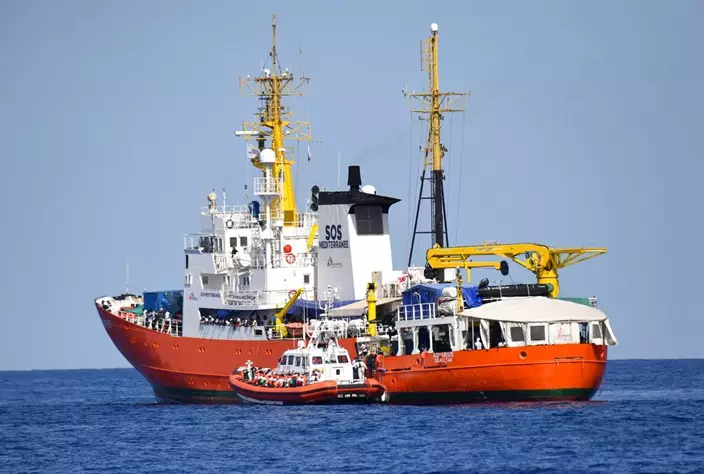
An Italian Coast Guard boat approaches the French NGO "SOS Mediterranee" Aquarius ship as migrants are being transferred, in the Mediterranean Sea, Tuesday, June 12, 2018. Italy dispatched two ships Tuesday to help take 629 migrants stuck off its shores on the days-long voyage to Spain in what is forecast to be bad weather, after the new populist government refused them safe port in a dramatic bid to force Europe to share the burden of unrelenting arrivals. (AP Photo/Salvatore Cavalli)
Official ministry figures show that Italy has accepted 640,000 migrants since 2014.
While Salvini turned away the Aquarius, an Italian Coast Guard vessel with more than 900 migrants rescued in seven operations is expected to reach Italy's shores on Wednesday.
The emergency was prompting vastly different reactions in European capitals.
Hungary's radically anti-immigrant prime minister praised Salvini's move. Viktor Orban said his initial reaction was a sigh of "Finally!" He called it "a great moment which may finally bring changes in Europe's migration policies."
French President Emmanuel Macron criticized what he called Italy's cynicism and irresponsibility for leaving the migrants at sea, while also deflecting criticism for not allowing the ship to dock in France.
Macron's spokesman, Benjamin Griveaux, said France doesn't want to "start a precedent" that would allow some European countries to breach international laws and rely on other EU member states. But he quoted Macron as telling Tuesday's weekly Cabinet meeting: "If any ship was closer to France's shores, it could obviously dock on the French coast."
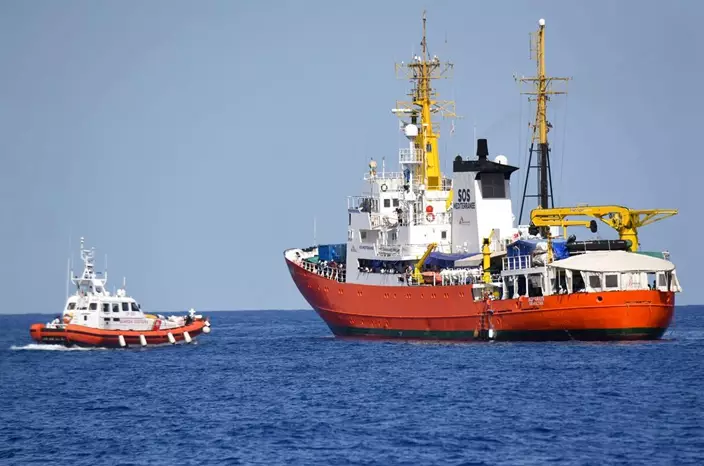
An Italian Coast Guard boat, left, approaches the French NGO "SOS Mediterranee" Aquarius ship, in the Mediterranean Sea, Tuesday, June 12, 2018. Italy dispatched two ships Tuesday to help take 629 migrants stuck off its shores on the days-long voyage to Spain in what is forecast to be bad weather, after the new populist government refused them safe port in a dramatic bid to force Europe to share the burden of unrelenting arrivals. (AP Photo/Salvatore Cavalli)
The new Spanish foreign minister, Josep Borrell, said the decision to offer a docking port in the eastern city of Valencia had been a "personal and direct" move by the new prime minister, the Socialist Pedro Sanchez.
Borrell said he hoped his country's gesture of solidarity would help push other EU members to re-examine migrant policy at a summit later this month.
Many Spanish regions and cities have offered long-term support to the migrants, said Valencia's regional vice president, Monica Oltra. The Red Cross was preparing shelter and medical assistance to meet immediate needs on their arrival.
Doctors Without Borders expressed particular concern for patients who had been resuscitated and risked developing "significant pulmonary disease after swallowing sea water." Another 21 patients suffered severe chemical burns from exposure to sea water mixed with fuel, while others need immediate surgery for orthopedic issues.
SOS Mediterannee said that moving the Aquarius from a busy Mediterranean crossing was also risking lives.
"People are still fleeing Libya while the Aquarius is away from the search and rescue area in the Central Mediterranean, where rescue capacities are already totally insufficient," said the charity's vice president, Sophie Beau.



